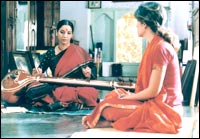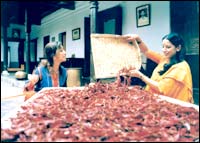 Guitarists are dweebs. This is a truism, if you think about it. They're the social outcasts, the only ones with time enough to sit for hours and practice relentlessly. An overcompensating third limb makes up for their utter lack of amiable personality, and they bury themselves in the indiscriminate warmth of frets and strings.
Guitarists are dweebs. This is a truism, if you think about it. They're the social outcasts, the only ones with time enough to sit for hours and practice relentlessly. An overcompensating third limb makes up for their utter lack of amiable personality, and they bury themselves in the indiscriminate warmth of frets and strings.
It's quite universal if you ignore the long mop and designer stubble, the greatest strummers are people extremely socially inadequate and nerdy: Clapton is as square a rocker as you can ever hope to find, and, on the other end of the spectrum, a Steve Vai is geeky enough to be king of the Trekkies. They are, essentially, a sad lot.
This is superbly recognised in Morning Raga, with Munna, played by Vivek Mashru. Not conforming to standard 'cool' cinematic guitar-toting clichés, he wears dorky glasses, and spends his time drooling wordlessly over Andhra posters of overweight smut.
He wistfully strokes the rear end of a mannequin, and breaks into a goofy grin when confronted with Perizaad's own rather shapely posterior. His conversation is limited, awkward, hesitant and if you've ever been in or hung out with a wannabe rock band, you know this fellow.
| |||||||||||
That's it for familiarity, however. The rest of the film drags on with the painful predictability and languorous, affectionate storytelling peculiar to cinema made by much older people trying hard to relate to the younger generation.
The bits about the band are the most jarring. For one, the characters keep referring to it as 'a music group', which is darned annoying. When, in the history of college canteens, have band members referred to their collective as a 'group'?
Actually, a lot of the usage of English in the film is deplorable. Packaged as a meeting of the generations over the confluence of musical styles, it falls short by far. The characters seem unlikely to spout English throughout, even with the setting down south, yet they persist. This creates a sense of detachment, makes them more obvious cinematic cutouts instead of the real people we empathise with. The dialogue is unnervingly plain and free of frills, yet does not strike as frank.
The lack of credibility is further stressed when they spout trite lines as if The Bard himself profoundly wrote them. They are not. In fact, their banality hits you in the face. 'You didn't love him' 'Did you?' 'You only loved yourself.' 'Didn't you?'
The integral problem with adapting a theatrical concept on screen is that it is hard to translate the subtleties of stage and pack them into a more demanding format for a more demanding audience. There is no space to really write between lines, and there is much less room to linger. A clear plot and concept might not be theatrical prerequisites, but cinema conventionally needs these in order to form a cohesive whole.
 Lilette Dubey sparkles in the film, the only character to bring true believability to the movie. As Mrs Kapur, the superficial mother to Perizaad's Pinky, she shows immense screen presence and rattles off even the most mediocre of lines with enough flair to make up for them.
Lilette Dubey sparkles in the film, the only character to bring true believability to the movie. As Mrs Kapur, the superficial mother to Perizaad's Pinky, she shows immense screen presence and rattles off even the most mediocre of lines with enough flair to make up for them.
Shabana Azmi, of course, can navigate these roles blindfolded, and deserves a fair share of kudos for her effective Carnatic portrayal.
Perizaad Zorabian is a talented actress with lots to learn, and she is adequate in this performance, but mouthing insignificant lines isn't going to help her. She does stand out in a few scenes, but this will not be called a memorable performance.
Prakash Rao, the leading man of the film, happens to be the producer's son, a fact that will forever eclipse his aptness to the role. Nepotism aside, the lad is quite believable and earnest, and seems to have worked hard on his character.
The film is about three characters, and unfolds from an accident featuring one of them and killing the other two's parents. There is classic elbowroom to delve into complexity here, to explore what these deeply troubled characters are going through, and their interconnected relationships.
There is even a promising moment where Pinky (Perizaad), who lost her father to alcohol, is saddened by Abhinay (Prakash Rao) having had a few drinks. She sobs at this realisation, and Abhinay does not get it. She is a wreck at this point, wrestling with inner demons. You wait to see what poignancy unfolds.
Don't hold your breath. The film is excessively escapist in terms of human emotion, and relies on everybody eventually liking everybody else in the end, and confessing all. Moments of conflict and inner turmoil in Morning Raga are like item numbers, quick and engaging, but utterly disconnected to the rest of the film.
CREDITS
Cast: Shabana Azmi, Perizaad Zorabian, Prakash Rao, Lilette Dubey
Director: Mahesh Dattani
Producer: K Raghavendra Rao
Music: Amit Heri, Mani Sharma





